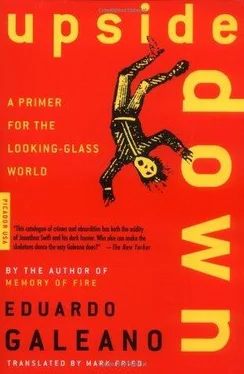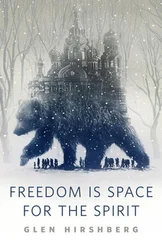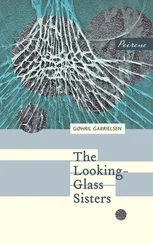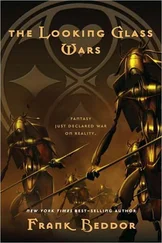The rest of Latin America’s laws were not as fervent as “due obedience,” but they all agreed that civilians should bow to armed arrogance; mandated by fear, they placed massacres beyond the reach of justice and gave the order to sweep all the rubbish of recent history under the rug. Most Uruguayans supported impunity in the plebiscite of 1989, following a media blitzkrieg that threatened a return to violence: what triumphed was fear, which among other things is a source of law. Sometimes hidden, sometimes visible, fear feeds and justifies power throughout Latin America. And power has deeper roots and more lasting structures than the governments that come and go with each democratic election.
What is power? An Argentine businessman, Alfredo Yabrán, defined it unmistakably: “Power is impunity.” He knew what he was talking about. Said to be the visible head of an omnipotent mafia, Yabrán started out selling ice cream on the street and ended up making a fortune for himself — or for who knows whom. Not long after he uttered that sentence, a judge issued a warrant for his arrest for the murder of photographer José Luis Cabezas. That marked the beginning of the end of his impunity, the beginning of the end of his power. Yabrán put a gun in his mouth and pulled the trigger.
Impunity is crime’s reward, openly promoting and encouraging more of the same. And when the criminal who has raped, robbed, tortured, and murdered without answering to anyone happens to be the state, a green light is flashed to all of society to rape, rob, torture, and kill. The same society that uses punishment like a scarecrow to frighten criminals at the bottom rewards them at the top with a lifetime get-out-of-jail-free card.
Democracy pays the consequences. It’s as if any murderer, smoking gun in hand, could ask: “Why should I be punished for killing one person, when those generals killed half the world and are walking the streets proud as can be? They’re heroes in the barracks and on Sunday they take Communion.”
Under democracy, Argentine dictator Jorge Rafael Videla took Communion in a church in the province of San Luis that refused entry to women in short sleeves or miniskirts. In the middle of 1998, he choked on the host: this pious fellow actually went to jail, though since he was a senior citizen he was soon granted house arrest. It was enough to make you rub your eyes: the exemplary obstinacy of the mothers, grandmothers, and children of the victims had wrought a miracle, an exception, one of very few. Videla, murderer of thousands, was not punished for genocide, but at least he had to answer for the children born in the concentration camps and kidnapped by officers who took them home as war booty after killing their mothers.
Advertising
The Argentine military dictatorship had a habit of sending many of its victims to the bottom of the ocean. In April 1998, a brand of clothing called Diesel placed an ad in Gente magazine intended to prove that its pants would hold up to any number of washings. A photograph showed eight young men chained to cement blocks in the depths of the sea. The caption read: “They aren’t your first jeans, but they could be your last. At least you’ll make a lovely body.”
Outlawed Memory
Bishop Juan Gerardi led a task force that rescued the recent history of terror in Guatemala. Bit by bit, through the testimonies of thousands of voices collected throughout the country, he and his colleagues gathered forty years of isolated memories of pain: 150,000 Guatemalans dead, 50,000 disappeared, 1,000,000 displaced refugees, 200,000 orphans, 40,000 widows. Nine out of every ten victims were unarmed civilians, most of them Indians. And in nine out of every ten cases, the responsibility lay with the army and its paramilitary bands.
The Church released the report on a Thursday in April 1998. Two days later, Bishop Gerardi was dead, his skull beaten in with a chunk of concrete.
Justice and memory are exotic luxuries in Latin America. The murderers of Uruguayan parliamentarians Zelmar Michelini and Héctor Gutiérrez Ruiz stroll calmly down the streets that bear the names of their victims. Forgetting, the powerful say, is the price of peace, and they impose on us a peace based on accepting injustice as an everyday norm. They’ve gotten us used to a peace in which life is scorned and remembering prohibited. The media and the schools don’t do much to help us integrate reality and memory. Every fact appears divorced from the rest, divorced from its own past and the past of every other fact. Consumer culture, a culture of disconnectedness, trains us to believe things just happen. Incapable of recalling its origins, the present paints the future as a repetition of itself; tomorrow is just another name for today. The unequal organization of the world, which beggars the human condition, is part of eternity, and injustice is a fact of life we have no choice but to accept.
Broken Memory
At the end of the eighteenth century, Napoleon’s soldiers discovered that many Egyptian children believed the Pyramids had been built by the French or the English.
At the end of the twentieth century, many Japanese children believed the bombs that fell on Hiroshima and Nagasaki had been dropped by the Russians.
In 1965, the people of Santo Domingo resisted an invasion of forty-two thousand U.S. Marines for 132 nights. People fought house by house, hand to hand, with sticks and knives and carbines and stones and broken bottles. What will Dominican children believe a little while from now? The government celebrates this heroic resistance not as a Day of Dignity but as the Day of Brotherhood, placing an equal sign between those who kissed the hands of the invaders and those who bared their breasts to the tanks.
Does history repeat itself? Or are its repetitions only penance for those who are incapable of listening to it? No history is mute. No matter how much they burn it, break it, and lie about it, human history refuses to shut its mouth. Despite deafness and ignorance, the time that was continues to tick inside the time that is. The right to remember does not figure among the human rights consecrated by the United Nations, but now more than ever we must insist on it and act on it. Not to repeat the past but to keep it from being repeated. Not to make us ventriloquists for the dead but to allow us to speak with voices that are not condemned to echo perpetually with stupidity and misfortune. When it’s truly alive, memory doesn’t contemplate history, it invites us to make it. More than in museums, where its poor old soul gets bored, memory is in the air we breathe, and from the air it breathes us.
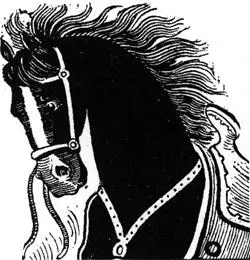
To forget forgetting: the Spanish writer Don Ramón Gómez de la Serna tells a story of a fellow who had such a bad memory that one day he forgot he had a bad memory and remembered everything. To remember the past, to free us of its curse, not to tie the feet of the present but to help the present walk without falling into the same old traps. Up until a few centuries ago, the Spanish word for “remember” also meant “wake up,” and it’s still used in that sense in some rural parts of Latin America. A memory that’s awake is contradictory, like us. It’s never still, and it changes along with us. It was born to be not an anchor but a catapult. A port of departure, not of arrival. It doesn’t turn away from nostalgia, but it prefers the dangers of hope. The Greeks believed memory was the sister of time and the sea, and they weren’t wrong.
Impunity is the child of bad memory. All the dictatorships that have ever existed in Latin America have known this well. They’ve burned entire mountain ranges of books, books guilty of revealing an outlawed reality and books simply guilty of being books, and mountains of documents as well. Military officers, presidents, priests: the history of burnings is a long one, dating from 1562 in Maní de Yucatán when Father Diego de Landa threw Mayan books into the flames, hoping to reduce indigenous memory to ashes. To mention only a few bonfires: in 1870, when the armies of Argentina, Brazil, and Uruguay razed Paraguay, the historical archives of the vanquished were torched; twenty years later, the government of Brazil burned all the papers that testified to three and a half centuries of black slavery; in 1983, the Argentine brass set fire to all the records of their dirty war against their countrymen; and in 1995, the Guatemalan military did the same.
Читать дальше
